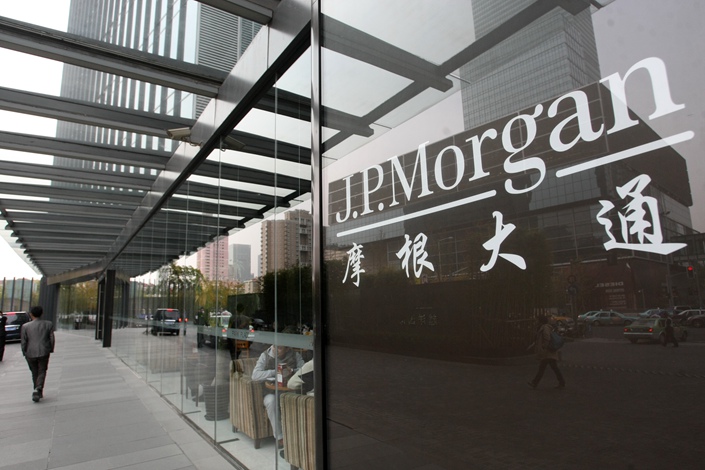JPMorgan to Boost China Headcount as Country Opens Up

As Beijing relaxes the rules for foreign financial players, JPMorgan Chase & Co. said it is growing the headcount of its China-focused business and reorganizing its investment banking teams to better reflect the country’s economy.
JPMorgan said it will increase the headcount of its China investment team by 40% to 50% over the next two to three years, without disclosing the team’s current size. Caixin has learned that UBS Group AG is also on a recruitment drive in the country.
JPMorgan is also restructuring how it categorizes industries in an effort to better reflect the Chinese business landscape, all of which are based around technology: financial services and technology, healthcare and technology, enterprise and technology services, new mobility, digital access, lifestyle and smart manufacturing, as well as infrastructure and commodities.
The bank plans to initially apply this structure to only its investment teams in China as “the new economy in China is newer than and very different from many economies in the West” and “all the traditional industry groups … are bearing less and less resemblance or relevance” to its clients in the country, said Murli Maiya, co-head of investment banking for Asia Pacific at JPMorgan.
This reorganization comes at a time when the bank is building up an onshore China securities business, specifically a joint venture in which it has a 51% stake. After Beijing relaxed its controls over foreign ownership of securities firms in March, financial institutions such as JPMorgan and UBS have applied to set up or increase their stake in onshore brokerages.
The institutions are gearing up for an investment market largely driven by technology unicorns — startups valued at more than $1 billion — that are expected by JPMorgan China investment banking head Houston Huang to raise around $200 billion in the next three years through initial public offerings and private funding rounds.
There are more than 150 unicorns in China, valued at more than $1 trillion in total. Ten of the most valuable 15 unicorns worldwide are from China, Huang said.
Against this backdrop, stock markets on the Chinese mainland and in Hong Kong have opened further to technology giants. The Hong Kong Stock Exchange in April approved new main board listing rules to lower the requirements for companies from emerging and innovative sectors. The mainland’s securities regulator has also launched a Chinese depositary receipt (CDR) pilot program, setting the scene for the country’s foreign-listed tech titans to trade shares at home.
So far, all CDR projects have been handled by Chinese investment banks, including China International Capital Corp. and Citic Securities Co. Ltd.
Contact reporter Coco Feng (renkefeng@caixin.com)

- 1China Officials Dismiss Tax Hike Rumors After Tech Selloff
- 2Cover Story: How Gutter Oil Became a Prized Fuel for International Airlines
- 3Prominent Chinese Journalist Liu Hu Detained by Police in Chengdu
- 4Maersk Unit Takes Over CK Hutchison Panama Ports After Court Ruling
- 5China Provinces Set Cautious 2026 Growth Targets
- 1Power To The People: Pintec Serves A Booming Consumer Class
- 2Largest hotel group in Europe accepts UnionPay
- 3UnionPay mobile QuickPass debuts in Hong Kong
- 4UnionPay International launches premium catering privilege U Dining Collection
- 5UnionPay International’s U Plan has covered over 1600 stores overseas






